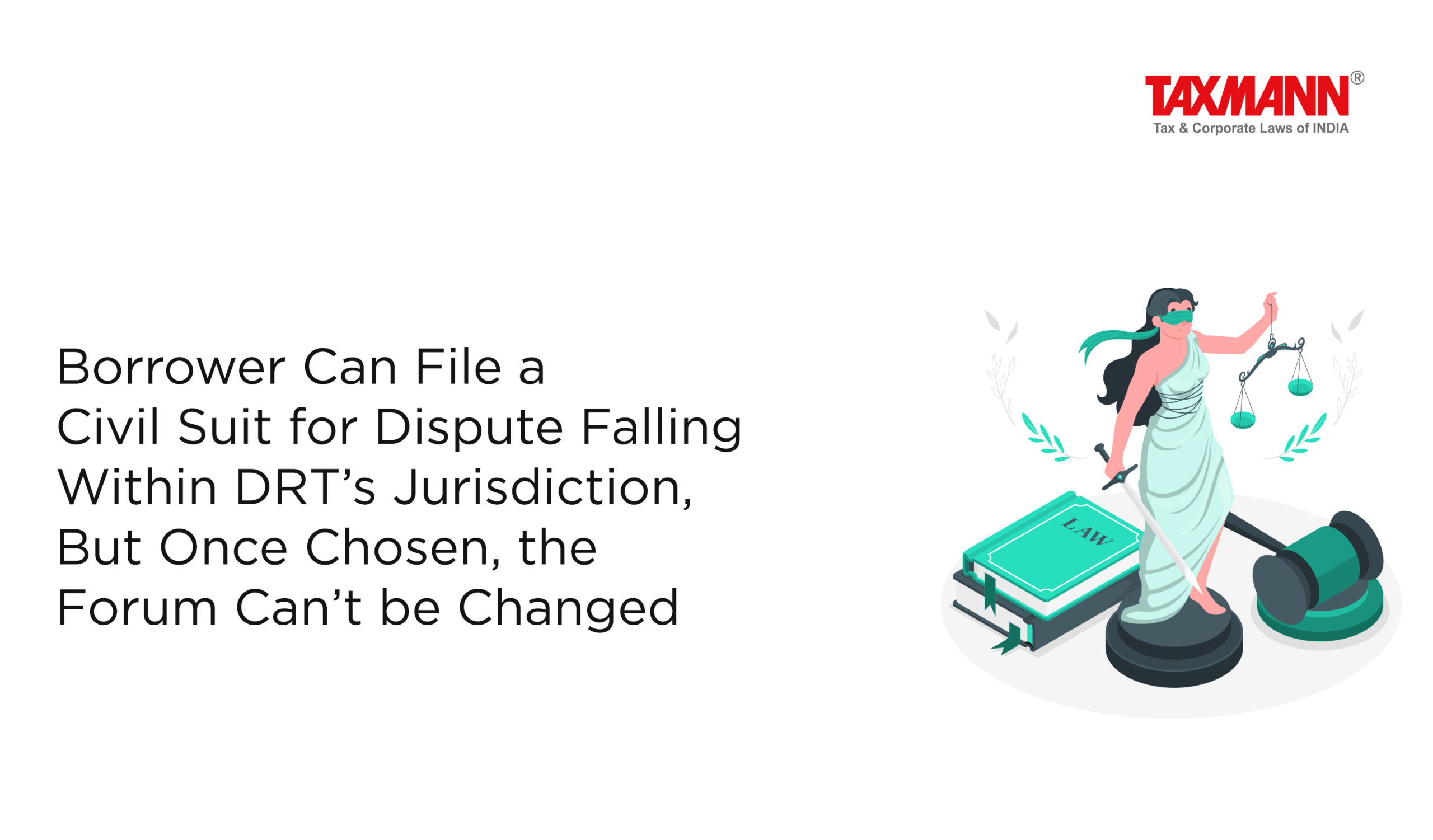Borrower Can File a Civil Suit for Dispute Falling Within DRT’s Jurisdiction, But Once Chosen, the Forum Can’t be Changed
- Blog|News|FEMA & Banking|
- 2 Min Read
- By Taxmann
- |
- Last Updated on 3 August, 2023

Case Details: Vishal Aggarwal v. Union Bank of India - [2023] 152 taxmann.com 357 (HC-Delhi)
Judiciary and Counsel Details
-
- Gaurang Kanth, J.
- Rahul Gupta & Shekhar Gupta, Advs. for the Appellant.
- Hari Kishan, S.A. Khan & Shadab Khan, Advs. for the Respondent.
Facts of the Case
In the instant case, a loan facility was extended by the respondent – bank to the borrower. Due to non-payment of the loan amount, the respondent issued a notice under section 13(4) of the SARFAESI Act, 2002.
The appellants challenged the said notice on the ground that the borrower executed registered sale deeds qua ground floor of the suit property in their favour and, thus, they were bona fide purchasers of the ground floor of the suit property.
The said objection was dismissed by the Debt Recovery Tribunal (DRT) and after considering the matter in detail, DRT issued a recovery certificate in favour of the bank qua different floors of the suit property. The appeal against the order of DRT was also dismissed as withdrawn.
The appellants thus, filed their objection before DRT-II. However, DRT-II also dismissed objections of the appellants by holding that the bank was entitled to recover its dues by selling the entire mortgaged property in question and, hence, the objection filed by the appellants qua ground floor of the suit property was dismissed.
Admittedly, the appellant never challenged the order passed by DRT-II. Hence, once the appellant submitted to the jurisdiction of DRT and after suffering from an order from DRT, the appellants could not be permitted to switch over the forum and pursue their remedy before the Civil Court.
High Court Held
The High Court observed that on the facts, the impugned judgment by the Trial Court dismissing the suit for declaration, permanent injunction and other reliefs filed by the appellants against respondents was justified.
The High Court held that the appellants were free to pursue their remedy before DRT in accordance with the law. The High Court, further held that there is no bar on a borrower to file a civil suit with respect to the dispute which is falling within the jurisdiction of DRT. However, once the borrower makes that choice, he cannot change the forum.
List of Cases Reviewed
-
- Vishal Aggarwal v. Union Bank of India [Suit No. 2977 of 2016, dated 10-4-2023] (para 27) affirmed.
- Bank of Rajasthan Ltd. v. VCK Shares and Stock Broking Services Ltd. [2022] 144 taxmann.com 193/[2023] 176 SCL 43 (SC) (FB) (para 21) followed.
List of Cases Referred to
-
- Vishal Aggarwal v. Union Bank of India [Suit No. 2977 of 2016, dated 10-4-2023] (para 1)
- Mrs. K.P Nambiar v. Rajender Aggarwal [CS (OS) No. 1788 of 1995, dated 7-2-1995] (para 5)
- Vishal Aggarwal. v. Punjab & Sind Bank [WP (C) No. 4910 of 2011, dated15-7-2011] (para 9)
- Bank of Rajasthan Ltd. v. VCK Shares & Stock Brocking Services Ltd. [2022] 144 taxmann.com 193/[2023] 176 SCL 43 (SC) (para 21)
- Union Bank of India v. Mis S.S Foam and Rubber Company [RC No. 297 of 2012, dated 17-7-2015] (para 23).
Disclaimer: The content/information published on the website is only for general information of the user and shall not be construed as legal advice. While the Taxmann has exercised reasonable efforts to ensure the veracity of information/content published, Taxmann shall be under no liability in any manner whatsoever for incorrect information, if any.

Taxmann Publications has a dedicated in-house Research & Editorial Team. This team consists of a team of Chartered Accountants, Company Secretaries, and Lawyers. This team works under the guidance and supervision of editor-in-chief Mr Rakesh Bhargava.
The Research and Editorial Team is responsible for developing reliable and accurate content for the readers. The team follows the six-sigma approach to achieve the benchmark of zero error in its publications and research platforms. The team ensures that the following publication guidelines are thoroughly followed while developing the content:
- The statutory material is obtained only from the authorized and reliable sources
- All the latest developments in the judicial and legislative fields are covered
- Prepare the analytical write-ups on current, controversial, and important issues to help the readers to understand the concept and its implications
- Every content published by Taxmann is complete, accurate and lucid
- All evidence-based statements are supported with proper reference to Section, Circular No., Notification No. or citations
- The golden rules of grammar, style and consistency are thoroughly followed
- Font and size that’s easy to read and remain consistent across all imprint and digital publications are applied



 CA | CS | CMA
CA | CS | CMA
